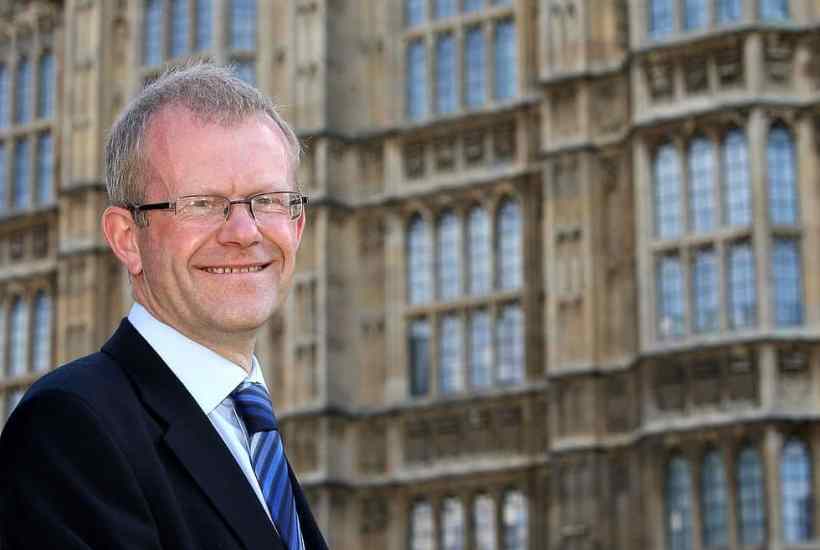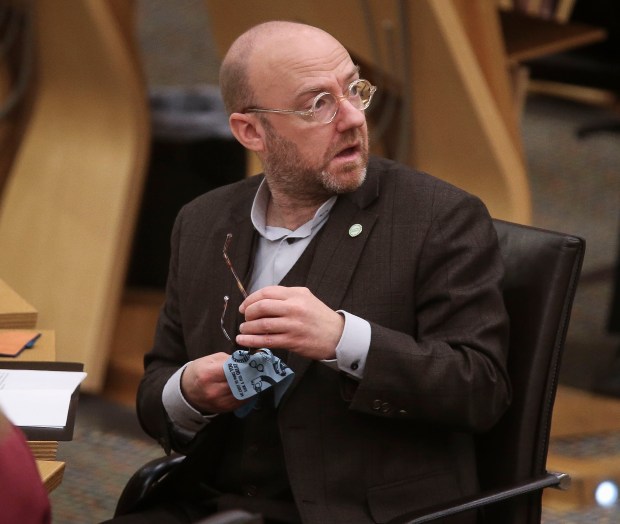One of the joys of living through a period of cultural revolution is watching all the new moralities arrive and declare themselves eternal truths. John Mason is learning this the hard way. Mason is the SNP MSP for Glasgow Shettleston, a Bible-believing Christian, something of a social conservative, and known for his mercurial views on evolution, the IRA, and his conviction that the island of Skye is not really an island.
This time Mason is in trouble for more mainstream opinions, which is to say opinions that are mainstream among the general public and therefore hate crimes in the eyes of the governing class. On Wednesday, Mason used a ministerial question time in the Scottish parliament to ask the SNP justice secretary Keith Brown about biologically male prisoners being held in women’s jails. I will quote Mason’s side of the exchange in full — it will soon become apparent why — and summarise Brown’s longer responses.
Mason opened with:
‘To ask the Scottish Government how many people whose biological sex is male are currently in women’s prisons in Scotland.’
Brown replied that there were five transgender women being held in women’s prisons in Scotland as of last week.
Mason followed this up with:
‘I thank the cabinet secretary for that answer, because the Scottish Prison Service would not give me the answer when I asked the question in September. I am glad that the answer is there, but does the cabinet secretary not think that female offenders, many of whom have suffered violence and sexual assault previously, should be entitled to a single-sex prison?’
Brown said the Scottish Prison Service tried to balance the rights and safety of all prisoners and noted there was a review under way into how data about this matter was collected to make it more up-to-date.
That was it. Immediately afterwards, Maggie Chapman got to her feet with a broadside against Mason disguised as a question. Chapman is a Green MSP, the Scottish Greens being a party that campaigns for gender self-identification, Scottish independence, and occasionally takes an interest in the environment. Chapman charged that ‘there was a very shrill anti-trans dog whistle in John Mason’s question, which is deeply troubling, especially given the rise in the number of transphobic hate crimes that are being reported’.
The implicit linking of a parliamentary question about transgender prisoners to criminal behaviour against transgender people was enough to prompt a response from the chair, deputy presiding officer Annabelle Ewing:
‘I am sure that the member did not want to suggest that, by asking his question, John Mason was doing any of those things. His question was selected and it was in the Business Bulletin.’
Mason’s woes didn’t end there. Out for Independence, ‘the official LGBTQ+ wing of the SNP’, has lodged a complaint against Mason with the party’s national secretary. It accuses him of ‘using derogatory, misgendering, transphobic language in clear contravention of the SNP’s definition of transphobia as agreed by our NEC’. Such behaviour, it contends, ‘is unacceptable both in our party and our parliament’ and further condemns Mason for ‘drawing public ire toward some of the most vulnerable people in our society and putting them at risk of harm’. Finally, Out for Independence charges that Mason’s query ‘only serves to reinforce incarceration as the primary tool of justice’ and argues that ‘we need to re-examine the role prisons play in the justice system’.
This is why it was important to quote Mason’s questions in full. Scroll back and read them. Do you see anything ‘derogatory’, ‘misgendering’, or ‘transphobic’? Even the phrase ‘people whose biological sex is male’, which some will find offensive in its statement of fact, doesn’t question the gender identity of these prisoners. The only grounds you could have for objecting to such a question is that a) it fails to conflate sex with gender or b) it raises the subject of women’s rights and safety.
Even setting aside the acronym-flinging hostilities of the gender wars, if MSPs cannot ask orderly parliamentary questions about public policy without the threat of disciplinary action, parliament cannot function properly. Holyrood is dysfunctional enough, thank you very much. Indeed, it requires a galaxy brain to conclude that the problem with SNP backbenchers is that they ask too many hard questions of ministers.
As it happens, one of the few things I admire about Nicola Sturgeon’s government is its modest progress towards a more liberal prisons and criminal justice policy. Whether it is extending the franchise to prisoners or the reforms proposed in the Scottish government’s consultation on bail and release from custody, Holyrood is lightyears ahead of Westminster’s self-defeating bang-‘em-up approach. In fact, not only do I agree with Out for Independence that incarceration should not be a primary tool of justice, I think their call to ‘re-examine the role prisons play’ is too conservative. While long-term detention is necessary for certain classes of offender, the evidence is already in on prison: it is, to no small degree, a failed, outdated, expensive and counterproductive remedy.
It is not that trans women are by their nature a threat to women but that some males are a threat to both, harming women and hiding behind the label ‘trans woman’ to do so. It is equally the case that opposite-sex prisons are inappropriate for trans prisoners, a particularly vulnerable group. While this debate typically focuses on trans women, there is also the question of trans men. However gender-affirming we might wish to be, the risks of placing biological females in a men’s prison are obvious.
What is the solution? Honestly, I don’t know. Building separate prisons for trans women and trans men might seem logical but it would be expensive, could see trans prisoners concentrated in a way that limits visits by relatives, could psychologically distress prisoners with gender dysphoria and would run counter to a post-carceral criminal justice policy.
An alternative would be to adapt existing prisons to house trans prisoners in a way that broadly affirms their gender identity but maintains two separate, single-sex estates within each prison. This wouldn’t be cheap, either, and the risk of gaps in single-sex protocols would probably earn this set-up the opposition of gender-critical feminists. Given the numbers of trans prisoners, it could also in some cases lead to de facto solitary confinement.
So, I don’t have an answer, but I know one won’t be found by branding anyone who asks questions ‘derogatory’ and ‘transphobic’.
Got something to add? Join the discussion and comment below.
Get 10 issues for just $10
Subscribe to The Spectator Australia today for the next 10 magazine issues, plus full online access, for just $10.



















Comments
Don't miss out
Join the conversation with other Spectator Australia readers. Subscribe to leave a comment.
SUBSCRIBEAlready a subscriber? Log in